Note from the CEO

In this newsletter you’ll read about exciting new resources for farmers including new courses, a bilingual landseeker toolshed added to our website, and for salmon fishers, relief loans to address the closure of salmon season again this year.
We will be launching an online course Bookkeeping in Practice to help farmers set up or strengthen their bookkeeping systems. We will be bringing our Spanish-language business course, El Resilerador, to farmers in the San Joaquin Valley for the first time. Alumni of the course can get technical assistance, to help make informed decisions including quantifying their crop yields into cash flow projections.
As a statewide organization we strive to gradually build on historical success, to serve more clients with high quality programs in new regions. Our near-term focus to strengthen educational offerings in the Central Valley is driven by strong demand for wealth-building practices and services. We’re also investing in the San Diego region, where we recently welcomed Katia Carranza to the Equity and Conservation on Working Lands team, as part of a growing partnership focused on land access and good land tenure
Thank you for your support and partnership.
Warmly,
Reggie Knox
Table of Contents
Bridging the Gap: Conservation Bridge Loans Empower Farmers to Implement Climate-Smart Practices
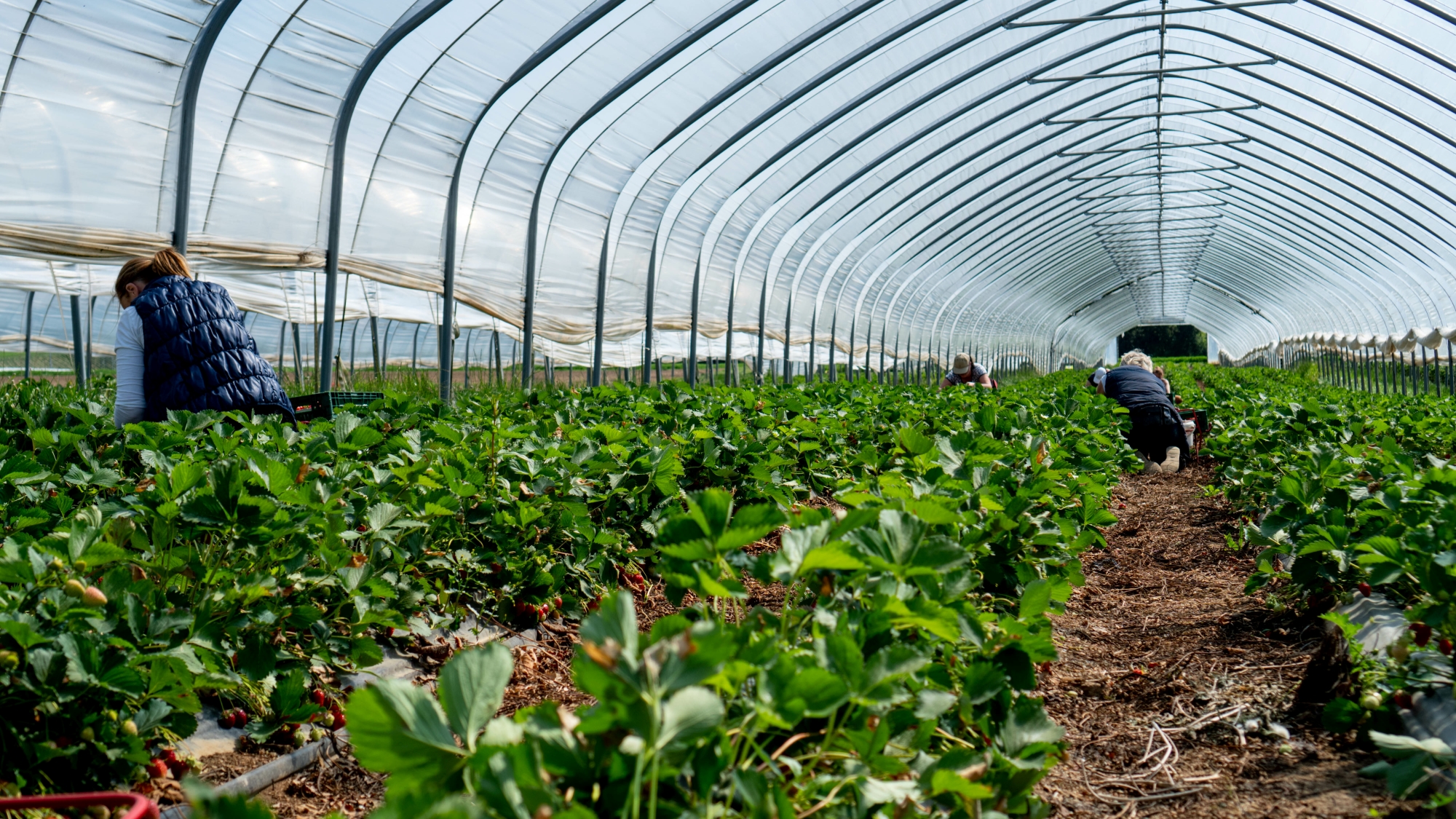
Climate change is reshaping California agriculture, creating urgent needs for climate-smart conservation practices. While federal and state programs exist to support these adaptations, their structures often create a barrier: farmers must pay substantial upfront costs and wait months for reimbursements. Some programs have a process to overcome the cash flow challenge, but FarmLink and its partners have designed wrap-around alternatives.
To help farmers overcome financial barriers, California FarmLink created the Conservation Bridge Loan Program, which offers loans with interest rates as low as 0%. These loans allow immediate implementation of conservation practices, with repayment scheduled once the farmer receives reimbursement. The program expands access to initiatives such as SWEEP, EQIP, Healthy Soils, and the Carl Moyer Program (see below for more information), offering hands-on support in English and Spanish to guide farmers through technical and financial processes to get support for their climate-smart practices.
“The Conservation Bridge Loan is designed specifically for small and underserved farmers who are implementing conservation practices,” says Tito Ortega, FarmLink loan officer. “It combines access to capital with deep relationship-based support, technical assistance, and a strong understanding of the unique challenges in sustainable and small-scale agriculture.”
The bridge loan's effectiveness stems from powerful partnerships with Resource Conservation Districts (RCDs) and technical service providers, who guide farmers through conservation planning and program applications, then connect eligible candidates with FarmLink for financial support. This collaboration bridges a crucial gap, ensuring farmers can act immediately rather than wait until they have sufficient cash flow to enroll in the programs.
"This is a true example of partnership in action," says Sacha Lozano, Ag Stewardship Senior Program Manager from the RCD of Santa Cruz County. "By working with California FarmLink, we help farmers bridge the gap between technical assistance and the resources they need to implement climate-smart practices. It’s about giving farmers the support they need to succeed and thrive on their land. "
Since its launch in 2024, the Conservation Bridge Loan Program has already had a measurable impact, with over 15 referrals from partner organizations, six farmers funded in the first year, and an average loan of $133,249 enabling substantial conservation investments. These loans have allowed farmers to implement critical conservation practices despite their lack of resources to make an upfront investment, improving water efficiency, soil health, energy use, and overall farm sustainability.

At World’s Finest Farms in Hollister, the program has already made a tangible difference. This certified organic operation, committed to delivering chemical-free food in areas with limited access to organic produce, partnered with their local RCD to secure a SWEEP grant for upgrades supporting water and energy conservation. Rather than delay critical improvements while waiting for funds, the farm used a Conservation Bridge Loan to begin work immediately.
"The support we received from the RCD and California FarmLink has made it possible for us to take on projects we never could have funded on our own," said Yurisa Regalado, who oversees her family’s business at World’s Finest. "At first, I was nervous about applying and going through the process, but the team guided me every step of the way, making it feel manageable and easy."
The project included converting flood irrigation to drip systems, replacing old, leaky irrigation lines, installing soil moisture sensors, adding a flow meter, upgrading a 15 HP well pump to solar power, and installing rooftop solar panels. The results? A 30% reduction in water use by converting from flood irrigation to precision drip systems, a 40% decrease in energy costs resulting from the solar panels, and more precise water use through soil moisture sensors.
"Now I can focus on what matters most, growing high-quality organic crops for our community, while also saving water and reducing costs," says Regalado. "Having the right resources lets me run the farm efficiently and keep it sustainable for years to come."
At Molino Creek Farm, an organic operation near Davenport, the bridge loan is helping the farm collective plan for decades of sustainable farming. Historically known for its dry-farmed tomatoes, the farm relies on rainfall and minimal irrigation. To adapt to increasingly unpredictable water availability and shift toward more resilient practices, the farm partnered with their RCD to secure a SWEEP contract. This support allowed them to implement water- and energy-saving improvements immediately and rethink their approach to farming.
“Dry farming has carried us this far, but climate change demands new approaches,” says Sharon Potteiger of Molino Creek. “With tools like irrigation and soil-moisture monitoring, we can secure this land for the next generation while proving that conservation and production go hand-in-hand.”
The farm is installing soil moisture sensors, converting micro-sprinklers in the olive orchard to more efficient systems, and upgrading a 15 HP well pump to solar. While they’ve mainly depended on dry farming, these upgrades give them flexibility to grow a wider variety of crops, manage water resources more precisely, and plan for long-term resilience.
“This support doesn’t just help us now; it allows us to think about the farm’s future, the children who grow up here, and how we can steward the land for decades to come,” Sharon adds.
.png)
These success stories make one thing clear: when financial barriers are removed, farmers can act on conservation when it matters most. From reducing wildfire risks to improving water efficiency and building healthy soils, Conservation Bridge Loans give farmers the support they need to take immediate, sustainable action without putting their farms at financial risk.
“The Conservation Bridge Loan isn’t just about money—it’s about partnership,” says Tito Ortega. “Working closely with borrowers, we build trust, overcome barriers, and help turn conservation goals into reality. It’s one of the most impactful tools we have to promote equity, resilience, and sustainability in agriculture.”
By bridging the gap, California FarmLink enables farmers to implement climate-smart practices immediately, showing that with the right support, they can adopt sustainable technologies, increase efficiency, and strengthen their farm’s long-term resilience.
Learn more about FarmLink’s lending offerings at cafarmlink.org/lending. For more information on conservation programs, see SWEEP, EQIP, Healthy Soils, and the Carl Moyer Program

Extended Tax Filing Deadline Approaching
The October 15 deadline for filing extended 2024 tax returns is approaching fast, and our Tax Toolshed is here to help farmers, ranchers, and fishers get organized and file with confidence.
Available in English and Spanish, it offers practical resources to simplify tax preparation and ensure you don’t miss any important steps.The Toolshed includes diagnostic tools to focus on the lessons most relevant to your situation, short lessons with recordings, PowerPoints, and detailed notes, plus guidance on working with a tax preparer. A tax organizer workbook helps first-time filers or anyone looking to streamline the process.
Don’t wait! Use the Toolshed today to get your taxes in order and avoid last-minute stress before the October 15 deadline.
Capital for Beginning Farmers and Ranchers Act Reintroduced in Congress
.jpeg)
On September 15th, Congresswoman Marilyn Strickland (WA-10), Senator Peter Welch (D-VT), and Congresswoman Alma Adams (NC-12) reintroduced the bicameral Capital for Beginning Farmers and Ranchers Act. The bill will help new farmers and ranchers address early financial challenges. Its co-sponsors include Congressman Jimmy Panetta (CA-19) who serves the district where FarmLink is headquartered at our Aptos office.
“New farmers starting their businesses often face financial barriers,” said Strickland. “This bill gives farmers immediate access to capital as they begin their farming operations.” FarmLink and our partners at the National Sustainable Agriculture Coalition (NSAC) shaped the bill over years, based in large part on our experience helping beginning farmers to gain access to fair and affordable loans. The bill is designed to enable the USDA Farm Service Agency to match loan repayment terms to the early-stage capacity investments that beginning farmers require, such as equipment, bookkeeping systems. These early-stage investments provide benefits over multiple years and the legislation would allow for repayment periods to extend beyond a 12-month period.
“Many of the beginning farmers we work with face a fundamental challenge in obtaining intermediate-term capital. As they establish themselves in California agriculture, they need time to accumulate working capital and invest in critical startup costs,” reported Reggie Knox. “The Farm Service Agency typically rolls these costs into annual operating loans, leading borrowers to under-invest in start-up capacities and limiting their ability to establish a financial cushion and build equity.”
For more details and a full list of valued partners endorsing the legislation, see our blog.
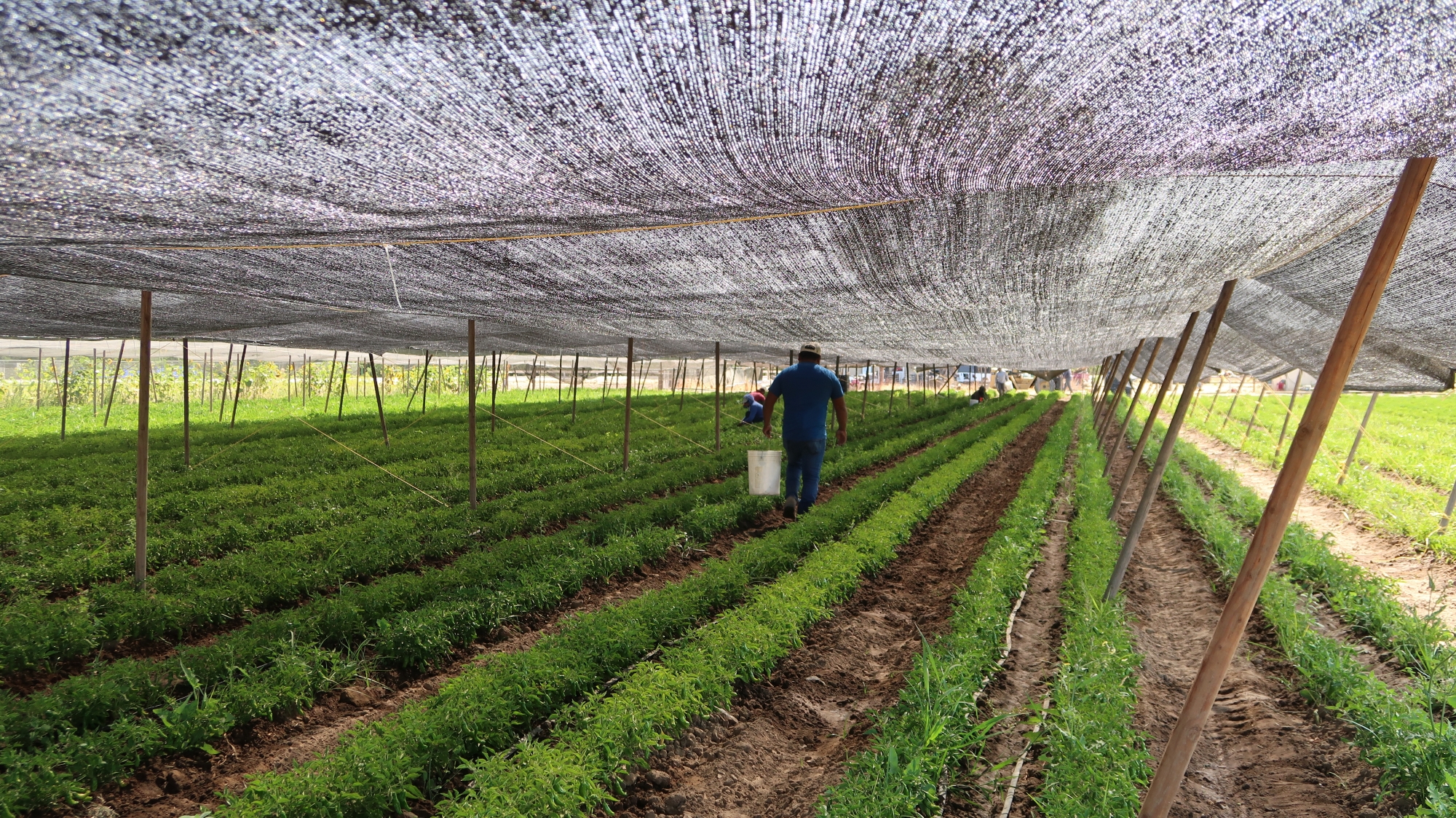
Farmer Advisory Committee: Grounding FarmLink’s Work
A strong nonprofit organization has the ability and flexibility to ensure consistent feedback and ideas from the people served. Over the past three years, FarmLink has facilitated a Farmer Advisory Council (FAC) made up of of clients representing a variety of communities and backgrounds that reflect our mission, programs, and services. The goal of the FAC is to ensure that FarmLink’s programs serve the specific needs of our diverse client communities, and to do so in the most inclusive way possible.
The FAC’s primary responsibility is to advise the board and staff on programs and services impacting their peers and communities. Their input focuses on program effectiveness, organizational priorities, potential improvements, emerging needs, and more.
Current FAC members include: Hernan 'Nan' Cavazos, Antonio Garza, AJ Gill, Javier Cruz Martinez, Veronica Mazariegos-Anastassiou, Janet Nagamine, Anna Nakamura Knight, Guadalupe Quintero, and Roberto Rodriguez. Their geographic scope ranges from Nevada County to the Monterey Bay region, and Riverside and San Diego counties.
Each member is expected and encouraged to bring attention to current trends and needs of the communities they represent. They meet quarterly, as facilitated by Andrea Levy, senior program manager for Resilience and Wealth Building. We are grateful for the FAC members’ voices and commitment to our work. Thank you!
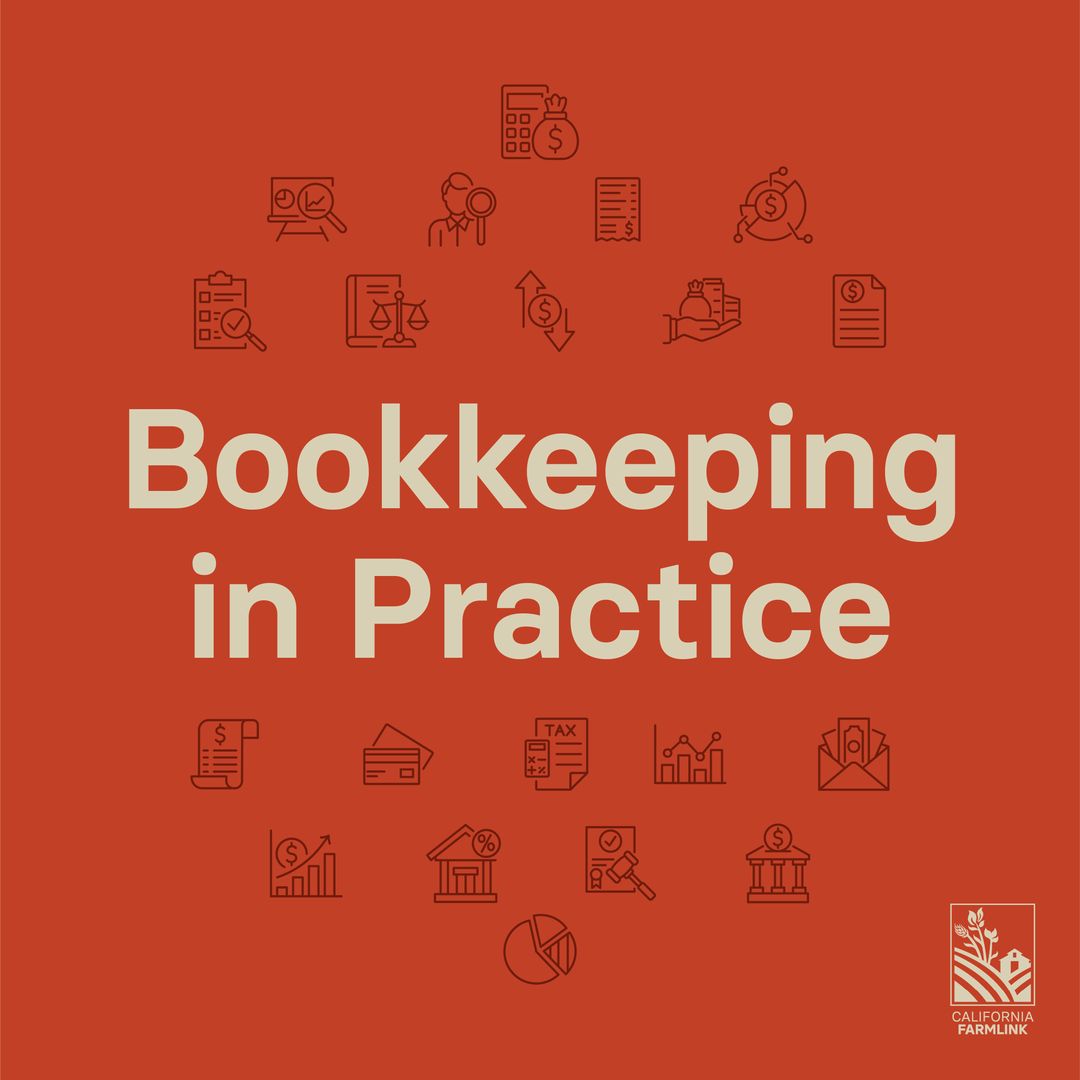
Introducing Bookkeeping in Practice: A QuickBooks Online Course for Resilerator Graduates
Strong financial systems are the backbone of resilient farms, ranches, and fishing businesses. With markets shifting and costs on the rise, clear bookkeeping can turn challenges into opportunities, giving you the tools to make informed decisions, manage cash flow with confidence, and build long-term stability.
That’s why we’re excited to launch Bookkeeping in Practice, an eight-week virtual course created for Resilerator™ and El Resilerador™ graduates. Through hands-on training in QuickBooks Online, you’ll learn how to set up or strengthen your bookkeeping system, from building your chart of accounts to tracking income and expenses, learning monthly reconciliation, and maintaining accurate records. Each session is designed to bring clarity to your bookkeeping practices and support smarter, more resilient business management.
Taught by Frances Andrews, a bookkeeper with firsthand farm business experience in California, the course runs weekly from January - March 2026 virtually on Zoom.
Graduates will receive an incentive package to put their learning into practice: a one-year QuickBooks Online subscription (up to $400 value) plus personalized one-on-one support from a bookkeeper. If you’re a Resilerator™ or El Resilerador™ graduate ready to gain practical bookkeeping skills, we encourage you to apply!
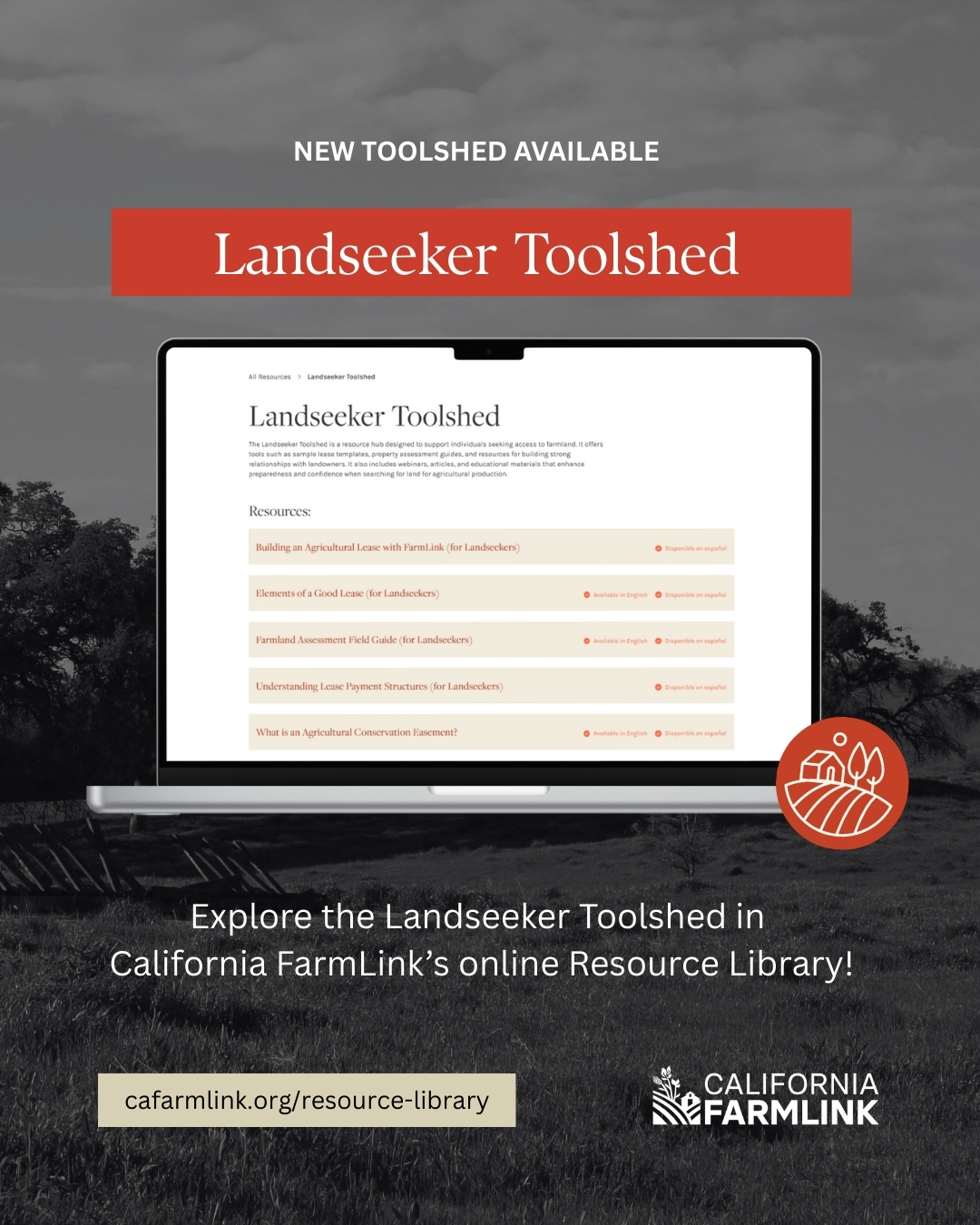
New Resource Available! The Landseeker Toolshed
We’re excited to announce that the Landseeker Toolshed is now live in our Resource Library. This comprehensive resource hub is designed to support individuals seeking access to farmland with materials available in both English and Spanish. It offers tools such as sample lease templates, property assessment guides, and resources for building strong relationships with landholders.
Building on the success of the Landholder Toolshed and related webinars, this toolshed goes beyond providing resources. It offers clear guidance and practical tools that empower landseekers to confidently navigate the process of finding and securing land, while strengthening the long-term stability of their agricultural businesses.
The Equity and Conservation on Working Lands team will continue to expand these efforts through additional educational resources, webinars, articles, and strategic outreach, ensuring equitable land access for small-scale agricultural businesses across California. Check out the Toolshed here.
Congratulations to Farmers Investing in Healthy Food Systems
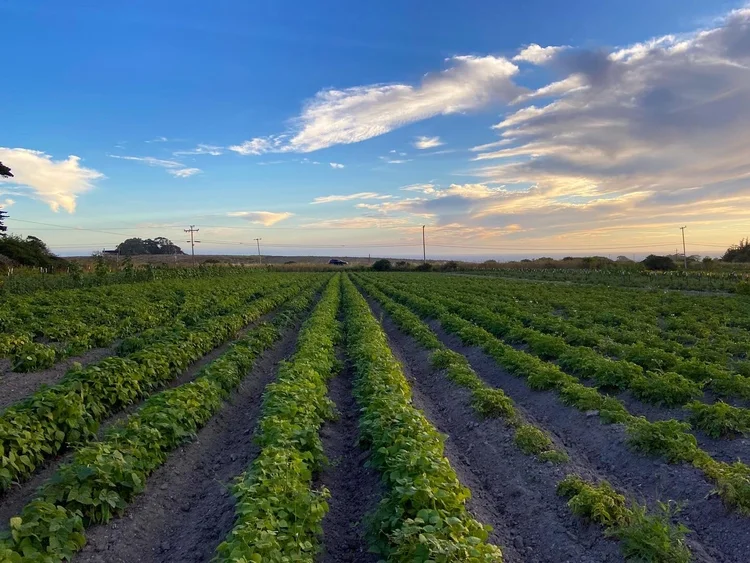
When provided an opportunity, small-scale farmers show that they are vital sources of entrepreneurial innovation in their communities. The recent announcement by the California Department of Food and Agriculture (CDFA) illustrates how the state’s strategic investment in small farms promises major benefits for health and wellbeing in rural California. Administered by CDFA, the state has awarded 12 grants totaling $13.75 million through the Farm to Community Food Hubs Grant Program. As described by CDFA, the resources are dedicated “for community food hubs to increase purchasing of local, environmentally sustainable, climate smart, and equitably produced food by schools and other institutions.”
Among the grant winners are two farms working closely with FarmLink and its ecosystem of partners: Brisa Ranch in coastal San Mateo County and Old Grove Orange in Riverside County. The grants were designed for either planning and start-up phases, and both of these awards are committed to start-up. In San Mateo County, Veronica Mazariegos-Anastassiou of Brisa Ranch, who serves on FarmLink’s Farmer Advisory Council, is part of a partnership launching the Coastside Local Food Hub with a nearly $2 million grant. Their work will connect nine farms with cold and dry storage, access to dry bean processing, and food safety support to facilitate food delivery to public schools, food banks, universities, and other institutions.
In Riverside County, Anna Nakamura Knight of Old Grove Orange and her family participated in the Regenerator: A Year of Farm Succession Planning. Their regional network of 30+ farmers have established farmer-led food hub programs and services rooted in certified organic farming and farm-to-school sales. Their food hub was awarded $1.8 million to build a commercial processing kitchen to meet increasing demand from public institutions for minimally processed, locally grown fruits and vegetables. Their project is the state’s longest-running K-12 farm-to-school food hub, serving the greater Los Angeles region.
We extend a hearty congratulations to these farmers. Learn more about their work at Coastside Local Food Hub and Old Grove Orange.
.png)
Update on the Employment Resilerator™ Course
The Employment Resilerator™, a 10-week course that empowers agricultural business owners to create and lead stronger, more resilient teams, has been rescheduled and will now launch in Winter 2026 (January–March). This new timing is intended to better align with the seasonal demands of farmers, fishers, and ranchers, offering greater flexibility during the winter months.
Through the course, participants will gain hands-on tools to improve job quality, foster inclusive workplaces, and move beyond legal compliance. Previously available only to Resilerator™ or El Resilerador™ graduates, the program is now open to other qualifying employers, with full eligibility criteria available on the course page.
Applications are still open! Don’t miss your chance to secure a spot in the Winter 2026 cohort and gain practical skills to strengthen your team, improve workplace culture, and build long-term resilience. We appreciate your continued interest and look forward to welcoming participants in January 2026!
.png)
El Resilerador Expands to the Central Valley in 2026
For the first time ever, El Resilerador™, our Spanish-language business course for farmers, is coming to the Central Valley. This in-person course provides Spanish-speaking farmers, with two or more years of experience, the tools to grow and strengthen their businesses.
The course will run from February 3 to March 17, 2026, every other Tuesday from 10:00 AM to 2:00 PM in Merced. Participants will learn practical skills in business structure, labor practices, record-keeping, taxes, and more, all designed to build resilience and a strong financial foundation.
Here’s what a past participant had to say:
"What I appreciated most about the Resilerador course was how it inspired us to be responsible owners, stay organized, follow regulations, and learn aspects of running a business I had never known before."
Applications are open through the first week of January 2026. Spanish-speaking farmers in Merced and surrounding areas are encouraged to apply. For questions or assistance with registration, please contact the Resilerator team.
Spread the word and don’t miss this chance to build resilience and long-term success for your business. Learn more and register here.
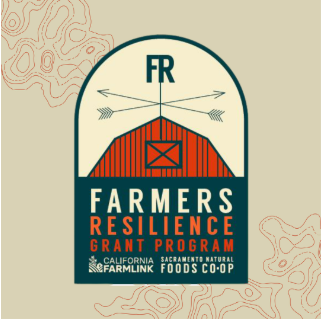
Farmers Resilience Grant Winners
In partnership with California FarmLink, the Sacramento Natural Foods Co-op awarded nearly $12,000 in grants to two small farmers this year. This was the fourth year of grants, a program seeded by our longtime partnership and sustained with resources provided by the co-op. This year’s winners include Yumm Strawberry Farm, for mobile cold storage to improve harvest and shelf life, and Honest Fish Farm, to purchase an egg washer for greater efficiency.
The grants focus on two outcomes for small farms: sustainability and business resilience. Grant selection is done by a review committee with representation from the co-op, FarmLink, and Yolo County farmer Lauren McNees. FarmLink’s deputy director of operations, Stephanie Stevens, facilitates the process in partnership with the co-op.
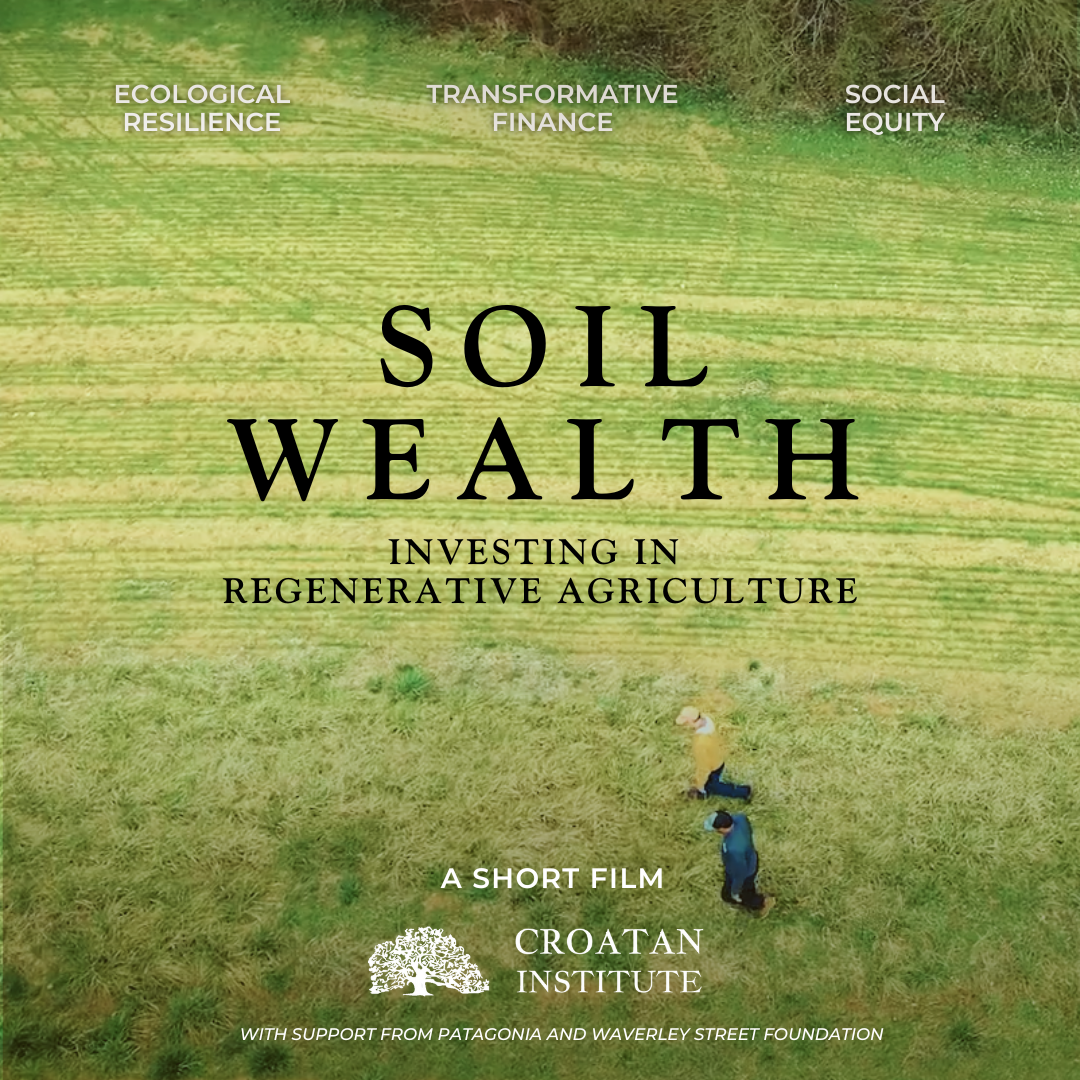
CEO Reggie Knox to join Croatan Institute for screening of "Soil Wealth: Investing in Regenerative Agriculture"
Our partners at Croatan Institute are embarking on a nationwide film tour with their debut production, Soil Wealth: Investing in Regenerative Agriculture to mobilize capital for resilient food, fiber, and forest systems. The next stop is Minneapolis on October 8, where Reggie Knox, CEO, will be one of the speakers at the screening event. He will also attend the Regenerative Food Systems Investment Forum. Learn more here.
.png)
We’re Hiring!
We're seeking a Loans Administration Associate who is eager to make a meaningful impact in California’s agricultural and fishing communities.
If you’re interested, please email your resume and a cover letter explaining your interest in the role to humanresources@cafarmlink.org. Be sure to include the job title in the subject line.







